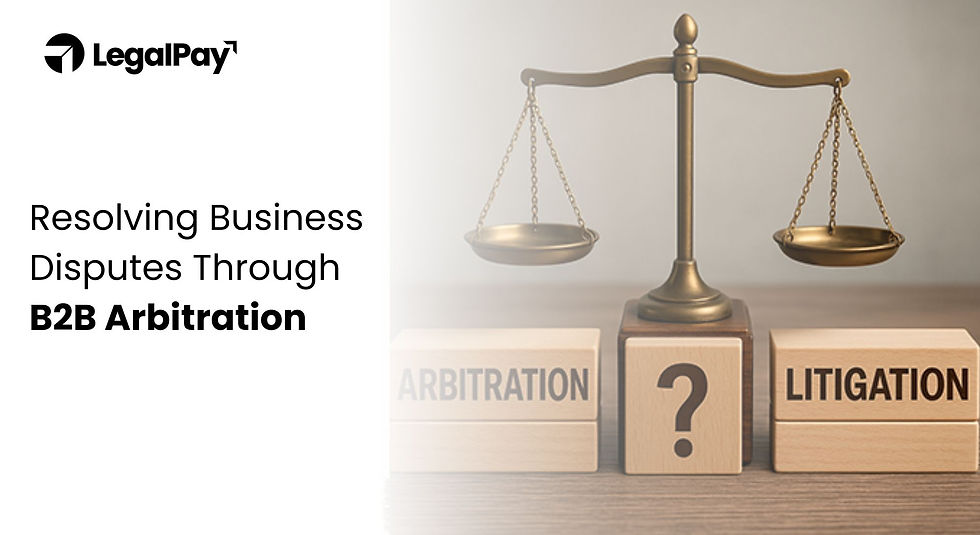Why Litigation Funding is Critical for Complex Commercial Cases
- Indrajeet
- Mar 3, 2025
- 6 min read

Complex commercial cases are often long, drawn-out legal battles involving significant sums of money and extensive resources. These disputes can take years to resolve, demanding financial endurance from both parties involved. For many businesses, especially small to medium enterprises (SMEs), the cost of pursuing or defending a legal case can be overwhelming. This is where litigation funding steps in as a crucial solution, providing the financial backing needed to pursue justice without depleting a company's resources.
In this blog, we will explore why litigation funding has become essential in complex commercial cases, how it works, and why it’s a game changer for businesses, law firms, and even individual plaintiffs. We will also examine the role of LegalPay, India’s pioneering litigation financing platform, in helping businesses navigate these difficult legal waters.
The Nature of Complex Commercial Cases
Commercial litigation often involves disputes over contracts, intellectual property, shareholder disagreements, fraud, breach of fiduciary duties, and other high-stakes issues. These cases typically require extensive documentation, expert testimony, and lengthy court proceedings, all of which drive up the cost.
Some characteristics of complex commercial cases include:
High Legal Costs: The more complex the case, the more specialized legal expertise is required, and the longer the process takes. The cost of expert witnesses, research, and even litigation discovery can add up to millions of dollars.
Extended Duration: These cases are rarely resolved quickly. It’s common for commercial disputes to stretch over several years, requiring plaintiffs and defendants to sustain litigation costs over long periods.
Uncertainty: Complex commercial disputes involve significant risk. There’s no guarantee of a favorable outcome, and even a strong case might face unforeseen hurdles in court, making it a risky financial endeavor for plaintiffs and their businesses.
Imbalanced Resources: Often, a financially stronger party may have more resources to prolong a case, wearing down the other side to push them into a settlement that may not be in their best interest.
For many businesses, especially those already grappling with the economic impact of a legal dispute, the costs and uncertainty can discourage them from pursuing litigation, even when they have a strong case. This is where litigation funding offers a lifeline.
How Litigation Funding Works
Litigation funding involves a third-party funder providing financial support to a plaintiff or a law firm in exchange for a portion of the settlement or judgment if the case is successful. If the case is unsuccessful, the funder typically bears the financial loss, as most litigation funding arrangements are non-recourse—meaning the plaintiff is not obligated to repay the funder if they lose the case.
Here's how litigation funding works in practice:
Initial Case Evaluation: The litigation funding company assesses the merits of the case, looking at the likelihood of success, potential financial returns, and risks involved.
Funding Agreement: Once a case is deemed viable, the funder enters into an agreement with the plaintiff, covering legal costs such as attorney fees, expert witness costs, court fees, and other litigation expenses.
Non-Recourse Financing: If the case is lost, the plaintiff is not responsible for repaying the funder. The funder absorbs the loss.
Sharing in the Success: If the case is won, the funder receives an agreed-upon percentage of the settlement or judgment. This ensures that the plaintiff retains a significant portion of the financial recovery while avoiding the upfront cost of litigation.
Why Litigation Funding is Critical for Complex Commercial Cases
1. Leveling the Playing Field
In many commercial disputes, the financially stronger party can use their resources to drag out the litigation, making it more expensive and difficult for the other party to keep up. Litigation funding ensures that plaintiffs, particularly small and medium-sized businesses, can level the playing field. By having access to financial backing, they can stand toe-to-toe with larger, more resourceful corporations without the fear of running out of funds mid-case.
2. Reducing Financial Risk
One of the most significant advantages of litigation funding is the reduction of financial risk. Plaintiffs are not required to spend their own money on legal fees, which can quickly spiral out of control in complex cases. Instead, they can pursue justice with the confidence that their business or personal finances won’t be jeopardized. Even in the case of an unfavorable judgment, plaintiffs are protected from further financial loss, as the funder takes on the risk of a loss.
3. Preserving Business Resources
For businesses, litigation can take a significant toll on financial resources, especially when funds are needed to keep the company running. By using litigation financing, businesses can avoid diverting their capital from operational activities to fund their legal battles. This allows them to preserve cash flow and maintain stability throughout the litigation process.
4. Empowering Legal Strategy
When plaintiffs are financially constrained, they might be forced to settle prematurely or take shortcuts in their legal strategy to save money. Litigation funding empowers businesses and their legal teams to pursue the best possible strategy rather than the most affordable one. They can afford to hire top-tier attorneys, engage the best expert witnesses, and allocate sufficient resources for a comprehensive defense or claim.
5. Encouraging Fair Settlements
Defendants in complex commercial cases often try to settle for much less than the actual value of a claim, assuming the plaintiff cannot afford to continue litigation. Litigation funding gives plaintiffs the financial stamina to hold out for a fair settlement rather than being forced into accepting an offer out of desperation. This creates an environment where settlements are more likely to reflect the true value of the case.
How LegalPay Has Helped in Complex Commercial Cases
LegalPay has played a pivotal role in transforming the litigation financing landscape in India, providing businesses with the financial support they need to pursue complex commercial disputes without incurring prohibitive costs. Here’s how LegalPay has made an impact:
Accessible Financing for SMEs: LegalPay provides litigation financing specifically tailored to small and medium-sized enterprises (SMEs), enabling them to pursue commercial claims they might otherwise abandon due to financial constraints.
Tailored Financing Solutions: LegalPay offers customizable funding models, from single-case funding to portfolio financing, which allows businesses and law firms to obtain funding for multiple cases, ensuring continuous support throughout litigation.
Fair and Transparent Practices: LegalPay is committed to transparency and fairness, ensuring that plaintiffs understand the terms of the funding agreements and retain control over their legal strategies. This allows businesses to pursue their legal claims without compromising their values or risking their financial future.
Conclusion
Complex commercial cases can be daunting, especially when the costs are high and the timeline for resolution is long. Litigation funding is not just a financial solution; it is a tool that allows businesses and plaintiffs to pursue justice without crippling financial stress. By covering litigation costs, reducing financial risks, and empowering plaintiffs to fight for fair settlements, litigation funding has become an essential resource for complex commercial cases.
Companies like LegalPay are leading the way by providing transparent, ethical, and effective financing options that help businesses and individuals navigate the complex legal landscape. With litigation financing, the scales of justice are no longer tipped in favor of the wealthiest party, but toward those with the strongest legal claims.
FAQs: Frequently Asked Questions About Litigation Funding
What types of cases are eligible for litigation funding?
Litigation funding is typically available for cases with significant financial stakes, such as commercial disputes, intellectual property claims, and shareholder lawsuits. The likelihood of success and potential return are key factors in determining eligibility.
How does a funder evaluate whether to finance a case?
Funders assess the merits of the case, the likelihood of success, the potential financial recovery, and the risks involved. They also consider the experience and track record of the legal team handling the case.
What happens if my case is unsuccessful?
Most litigation financing arrangements are non-recourse, meaning you are not obligated to repay the funder if your case is unsuccessful. The funder assumes the financial risk.
How much control do I lose in my case if I accept litigation funding?
You retain control over the legal strategy and decision-making in your case. Reputable funders like LegalPay ensure that the plaintiff and their legal team remain in charge of the case, with the funder only providing financial support.
What portion of the settlement does the funder receive?
The portion a funder receives varies depending on the case and the funding agreement. Typically, funders take an agreed-upon percentage of the settlement or judgment, reflecting the level of risk and investment involved.




Comments